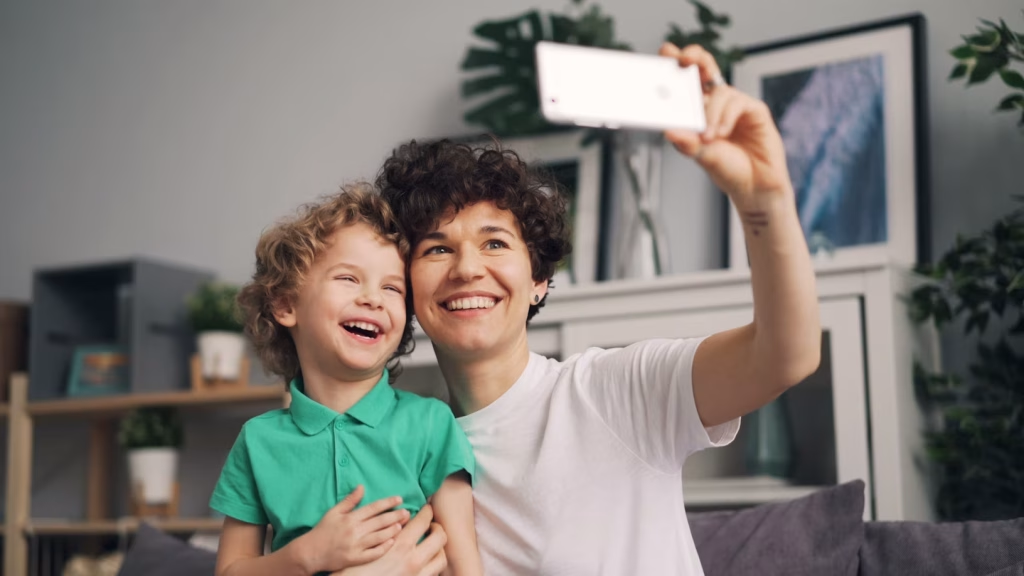
It’s no secret that proud parents love to share. From baby’s first steps to silly toddler antics, it’s easy to reach for your phone and post to your followers.
But lately, a bigger question is looming: should parents be fined for posting about their kids on social media without their consent? Around the world, countries like Italy and France are starting to say “yes—and the consequences can be serious.”
As the digital age blurs the lines between memory-making and privacy invasion, it’s time for families to rethink what they share and why it matters.
The Rise of Sharenting—and Its Risks
Sharenting, the act of sharing content about children online, is more common than we might think. Over 75% of parents post about their kids on social media, often without asking first. This might seem harmless at first glance, but studies show that sharenting can increase children’s exposure to privacy violations, identity theft, and even exploitation.
One recent survey on child data exposure revealed that many parents were unaware of how easily strangers could access images or personal details about their children. While most parents mean well, the long-term consequences can be more damaging than a few likes are worth.
Legal Backlash Is Already Happening
Around the globe, legal systems are stepping in to address sharenting—and it’s no longer just about family rules. In Italy, a 16-year-old boy successfully sued his own mother for posting his photos without permission. Italian copyright law gives ownership of one’s image to the person pictured—not the person who took the photo—meaning she faced a fine if she didn’t remove them.
Similarly, French privacy laws come with even steeper consequences: up to a year in prison and fines reaching €45,000 for posting images without consent. It’s a strong message to parents: your child’s image legally belongs to them, not your newsfeed.
The U.S. Approach: Less Strict, but Still Important
In the U.S., there isn’t yet a universal law penalizing parents for sharenting—but that doesn’t mean lawmakers aren’t paying attention.
The Children’s Online Privacy Protection Act (COPPA) primarily focuses on how websites collect data from children, requiring parental consent before any upload of a child’s image or personal info. While the law doesn’t explicitly punish parents for posting, it underscores kids’ rights to privacy in the digital sphere. As awareness grows, more conversations are emerging around placing similar accountability on parents themselves.
A Moral Dilemma: Whose Story Is It to Share?
Social media has become our digital scrapbook—but unlike the dusty albums on grandma’s shelf, this one never goes away. Kids are growing up to find their potty training pictures, emotional breakdowns, or awkward school plays all online—public, permanent, and searchable.
The ethical question is simple but powerful: Just because we can share, should we? Most children aren’t asked whether they’re okay with it. And by the time they’re old enough to care, it might already be too late to undo the damage.

How to Find a Healthy Posting Balance
It’s entirely possible to celebrate your child’s milestones online without crossing critical boundaries. One simple step is asking for your child’s permission before you post—especially once they’re old enough to understand. Skip any content that might embarrass them later, like photos of them crying, half-dressed, or having a tantrum.
Be extra cautious about including real names, school details, or geotags that could put them at risk. By modeling responsible online sharing, you’re teaching your child the value of digital consent—and protecting their future all at once.
Respect and Digital Rights Go Hand in Hand
As digital footprints become part of every child’s upbringing, we as caregivers have to lead with empathy, not impulse. Kids deserve the same dignity and privacy online that we expect for ourselves. Sharing their childhood moments can be joyful, but not at the cost of their personal safety or trust.
The laws in places like Italy and France may seem extreme, but they reflect something deeper: a growing need to prioritize children’s rights in every space, even digital ones. The goal isn’t to shame parents, but to help us all pause, reflect, and share with more care.
Let’s Talk Before We Post
Parenting in the internet age isn’t easy, and no one expects perfection. But before hitting “share,” it’s worth asking whose memory it really is—and who gets to decide how it’s preserved.
As discussions around digital consent gain momentum, there may come a day when parents in the U.S. face similar fines for posting about their kids without approval. Until then, the best we can do is lead with respect and protect our children’s voices—even when they’re still learning to use them.
For further insight on how to maintain child privacy while still enjoying social media, check out these tips for safer sharenting.
What are your thoughts—should parents be fined for posting about their kids on social media? Share your perspective below.
Read More:
- Internet Safety – Teaching Kids Online Boundaries
- Trouble Online: 10 Dangerous Activities Your Kids Are Participating In Online

Samantha Warren is a holistic marketing strategist with 8+ years of experience partnering with startups, Fortune 500 companies, and everything in between. With an entrepreneurial mindset, she excels at shaping brand narratives through data-driven, creative content. When she’s not working, Samantha loves to travel and draws inspiration from her trips to Thailand, Spain, Costa Rica, and beyond.